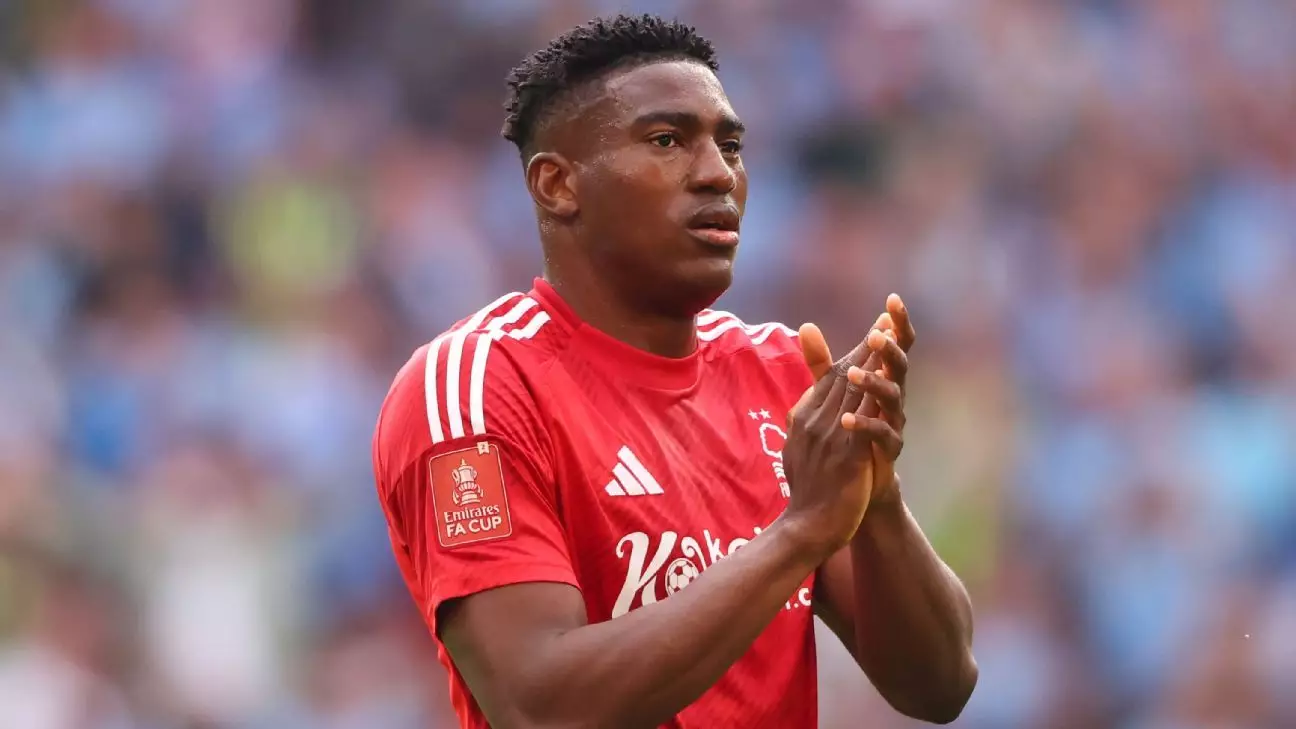On a recent match day in the Premier League, Nottingham Forest’s striker Taiwo Awoniyi found himself entangled in a life-altering situation, a stark reminder of the harsh realities professional athletes face. The Nigerian international was injured following a collision with the goalpost shortly after being introduced as a substitute during a high-stakes game against Leicester City. The gravity of his abdominal injury necessitated “urgent” surgery, leading to the unsettling decision to place him in an induced coma, a measure implemented to control his movements and stabilize his heart rate during recovery. This emotional turn of events reflects not just the precarious nature of sports, but also the broader implications for the team and its management.
The Aftermath of Injury: A Ripple Effect
In an extraordinary twist, this incident unleashed a wave of tension among the club’s hierarchy. Post-match discussions revealed a reported miscommunication between Nottingham Forest’s medical team and manager Nuno Espirito Santo. Awoniyi signaled to remain in the game despite evident distress, a choice that ultimately left the team playing with a significant handicap toward the end of their 2-2 draw against Leicester. The incident intensified scrutiny on the decision-making processes within the club; it raised vital questions surrounding player welfare and the protocols in place to ensure their well-being. Was it prudent to let a visibly injured player continue, even temporarily? Such decisions can leave scars—both physical and emotional—on an organization striving to balance competitive fervor and player safety.
Passion vs. Professionalism: The Owner’s Response
Forest owner Evangelos Marinakis’ emotional response became a focal point of post-match conversations. His visible frustration at witnessing Awoniyi’s pain led him to break from the sidelines, further complicating the dynamics of player management. The statement issued by the club described Marinakis’ actions as deeply caring and stemming from a genuine emotional investment in his players, categorizing him as a leader who prioritizes human concerns over bureaucratic protocols. As admirable as this passion is, it also raises a controversial dialogue about how such fervent investment can ignite impassioned, albeit uncoordinated, actions in pivotal moments.
Pressure of Performance: An Unforgiving Environment
In high-stakes scenarios like this, the pressure to perform can often overshadow crucial health considerations. Nottingham Forest sits on the cusp of qualifying for the Champions League, with only two games left to secure a coveted position among Europe’s elite football clubs. Such ambition can distort perceptions of urgency regarding player health. Stakeholders must interrogate whether the immediate goals justify potentially hazardous decisions regarding player welfare. Football, while a beloved sport, transforms into an intense battleground where sacrifices are made for success.
Navigating Policy and Ethics in Elite Sport
The incident serves as a critical lens into the existing policies surrounding player health, revealing glaring gaps in oversight. The possibility of Marinakis’ dual influence as president of Olympiakos raises ethical questions about governance in sports clubs. UEFA’s regulations aim to prevent any individual from exerting “decisive influence” over multiple clubs in its competitions, a rule put in place to ensure integrity. However, the question remains: how effectively are these rules enforced in the complex world of elite sport? The intertwining of personal investment and official responsibilities can lead to muddled priorities, risking player health for the sake of club advancement.
The Broader Perspective: Solidarity Beyond the Pitch
Awoniyi’s plight transcends individual injury; it highlights the collective struggle of athletes who bear the burden of professional expectations. The solidarity displayed by fans, teammates, and stakeholders alike represents a critical reminder that the emotional and physical costs of football reach far beyond the matchday narrative. While the urgency to claim victory is palpable, it is equally essential to foster an environment where player health is paramount—a culture where compassion and attentiveness to well-being take precedence over mere performance metrics. Only then can the sport genuinely thrive, maintaining its integrity both on and off the field.


Leave a Reply